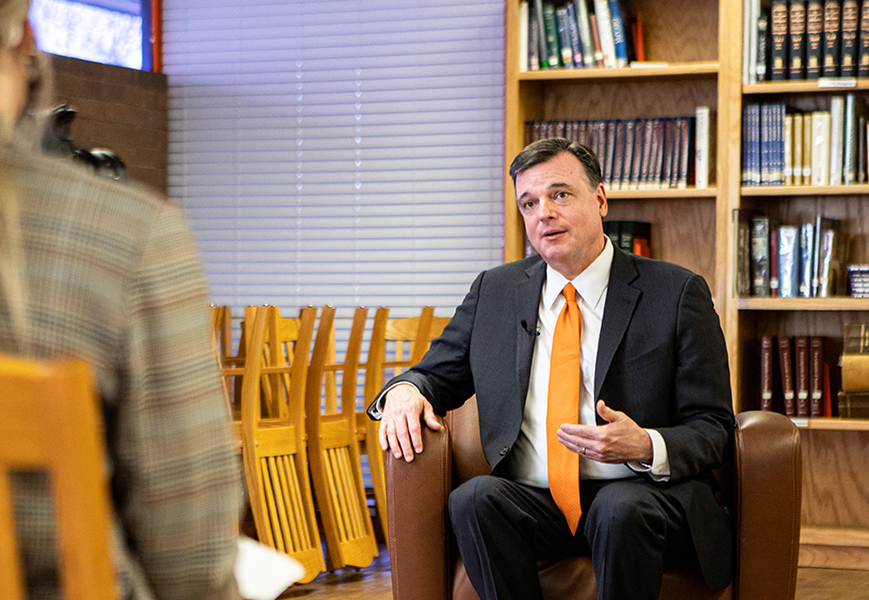Brubaker’s beginning
New TISD superintendent discusses plans for district
Photo by Caden Rainwater
TISD Superintendent Doug Brubaker discusses the future of Texas High with the staff of Tiger Times. Brubaker’s first day on the job was Jan. 4.
January 14, 2021
With the start of a new year comes the start of a new era at TISD. On Jan. 4, Dr. Doug Brubaker officially began his career as superintendent of Texarkana Independent School District. As the district embarks on their second semester, the question of what comes next has remained up in the air.
But before delving into the plans of Brubaker, it’s helpful to have the insight to where his passion for education came from.
“I worked in an outdoor education center, which is kind of like a summer camp, but there were outdoor learning opportunities involved with science and language arts,” Brubaker said. “In the course of working with [elementary] kids, I really enjoyed that experience during college and then went on to get my teachers certification, and I guess the rest is history.”
Despite holding the title for only a few days, Brubaker is wasting no time chasing his passion.
“When you think about education, to really be in a position where you can help ensure that the teachers and all the people who support them, the students as well, have all the resources and the services that they need in order to be at their very best, that’s a really exciting role to have. At the end of the day, because all of us are working hard and we’re working together, great things happen for kids,” Brubaker said. “Those things can be transformative in their lives.”
In an interview with the Tiger Times, Brubaker said his immediate plans were “to listen and to learn,” noting that he had no preset agenda.
“I have what’s called a 90-day entry plan. It’s based on a book called ‘The First 90 Days,’ and the idea is that when you come on board with a really fairly complex organization, you want to be really intentional and systematic about reaching out to people, learning about people and places and programs, and then figuring out ways that you can help contribute to the continued success of the organization,” Brubaker said. “I’ve been meeting with our senior staff and getting in front of student groups to start forming those relationships and developing that knowledge.”
During his interview, Brubaker shared his opinion on some issues with the staff, like the importance of preparing students for careers that don’t necessarily require college degrees.
“We need to show that there are great opportunities for people that don’t necessarily involve getting a four year college degree,” Brubaker said. “We have the sense that the road divides, and you’re either bound for college or you’re not. What I think we’re seeing now is that it’s not a matter of ‘or,’ it’s really an ‘and.’ Students may start out on one path and have an experience where through a career and technology program, they then decide that they want to go into another kind of career.”
Though there’s a rapidly increasing variety of career fields prospering, and it’s up to the school to prepare students for whichever path may suit them. Whether the path that takes students to the jobs they’ll love is straight or more complicated, the school serves to help them all the way.
“There’s a whole possibility for students’ [futures]. The model I’ve seen, looks kind of like a tree, and once you start moving up into these different career options, you may go out onto one branch and then come back and move up another, and all those career choices are valid,” Brubaker said.
An obvious challenge to the school’s capability to assist students as of late is, of course, COVID-19. While the future of the pandemic remains uncertain, questions regarding TISD’s remote learning program have been up for debate.
“I saw recently that the number of students that we have online has dropped from about 19% to around 15% now,” Brubaker said. “Where school districts have been able to use products and services that are tailor made for an online experience, it’s a little bit easier for the kids to use and for the teachers to teach. I think, truthfully, that there’s going to be a whole lot of research that comes out of this experience.”
With the concern that students will be behind because of the pandemic, the use of the state’s standardized test has become an issue.
“The STAAR test is a really important diagnostic tool. I think it’s going to be helpful to find out where students are, because we don’t necessarily have as good of a sense as we’d like to have,” Brubaker said. “One of the things I am encouraged by, if I understand correctly, is that we’re not going to be evaluated as a school district and that grades won’t be assigned based on that data. Our instructional services team is working very hard, already, to help kids who have been out of school for a period of time and have come back, to make sure that they’re caught up and performing well.”

















